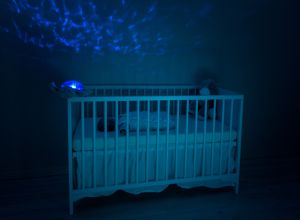Infants up to 1 year - sleep advice

Baby Sleep Info Source (Basis);
Adapted from Galland et al (2012) “Normal Sleep Patterns in Infants and Children: A Systematic review of Observational Studies”. Sleep Medicine Reviews 16(3):213-22
Newborn babies may sleep anywhere between 12 and 20 hours a day. Younger infants up to 6 months tend to sleep on and off around the clock, waking every 1–3 hours to feed.
The older they become, the more they may have a day/night cycle, but this is not guaranteed. Typically, they may have 2–3 daytime naps lasting about 30 minutes to 2 hours each.
Is it normal for babies to wake at night?
- Yes. It is normal for babies to wake during the night. Some babies sleep much more than others. Some sleep for long periods, others in short bursts. Some sleep through the night, some don't for a long time. Your baby will have their own pattern of waking and sleeping, and it's unlikely to be the same as other babies you know.
- All babies over 5 months of age will stir 4-6 times during the night as they come to the end of each sleep cycle. This is normal, it's the falling back to sleep that can be difficult.
Daytime naps advice:
- Daytime naps provide much needed downtime that aids the important physical and mental development that happens in early childhood
- They help keep babies and young children from becoming overtired, which can affect their mood and make it harder for them to fall asleep at night.
There's no single rule about how much daytime sleep infants need.
If your child is napping 'on the go' (for example in the car) try to ensure that this is balanced by daytime sleep in their own bed at home so that they get good quality daytime sleep over the course of a week.




Do babies and young children automatically fall into a good sleeping pattern?
- No. All babies and children need to be supported to develop a good sleep routine and good sleeping habits. It is a process that will take time and can’t be achieved in a few days. This can be a struggle, especially when you are sleep deprived and feel constantly tired yourself.
- All babies are different and will start sleeping through at different times. There also needs to be a degree of flexibility around sleep routines.
- You may find that if babies early on appear to sleep through the night, this will change over time and many will start night waking again as they get older.
What routines and habits promote good sleep?
There are many practical ways to develop and help improve your child’s sleeping routine and habits.
- Sleep during the early months occurs around the clock and the sleep-wake cycle is driven by the need to be fed, changed and given attention.
- During sleep, they are often active, twitching their arms and legs, smiling, sucking and generally appearing restless. Some babies may sleep with their eyes partially open.
- Infants express their need to sleep in different ways. Some fuss, cry or rub their eyes.
- Children benefit from being allowed to settle to sleep on their own while awake but drowsy. If children learn to settle independently, they will be more likely to self soothe back to sleep after natural night wakenings.
Bedtime routine:
- Develop regular daytime and bedtime schedules; maintain consistent sleep and wake times
- Create a consistent and enjoyable bedtime routine
- Establish a regular 'sleep friendly' environment (see advice below)
Sleep tips:
- Observe sleep patterns and identify signs of sleepiness.
- Put newborn in a cot or Moses basket (even during the day) when they are drowsy, and not asleep, to encourage self-settling.
- Encourage night time sleep; as evening approaches try to make the environment quieter and lighting dimmer with less activity.
All babies cry and it can be upsetting and frustrating. Not every baby is easy to calm but that doesn’t mean you are doing anything wrong. For tips on infant crying and how to cope see ICON and/or talk to your health visitor.




My child is tired, so why won’t they sleep?
If a child is happy, comfortable, and tired, problems falling asleep are likely to be behavioural (such as bedtime resistance) or environmental (such as noise).
I’ve tried all of the above and my baby is still waking frequently!
Some babies take longer than others to respond to a routine and settle into good sleep habits. Look after yourself. Almost all adults find interrupted sleep makes them feel tired and irritable, and relationships can suffer.
Resources for Parents
NHS: Sleep tips for parents of young children
NHS: Sleep tips for teenagers



